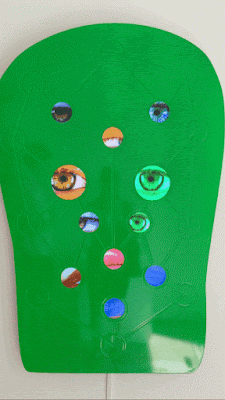Our INCREDIBLE Date Night
Knowing we were here for just a couple of days of the Festival d'Avignon, we bought tickets to the opening production which began at 10 PM.
Following a much needed afternoon nap, Steve and I spent our pre-theater time at the über awesome Maison des Vins' summer setup, the Bar À Vins."For 17 years now, the Côtes du Rhône Wine Bar has been delighting the taste buds of thousands of festival-goers and is in full swing throughout the month of July."
Live music, fun foods, free-flowing wine, and personable winemakers all combined to make yet another magical moment for us in Avignon.
Steve's favorite wine of the night was Johan by Domaine Moun Pantai. By the way, this is Johan, the varietal's namesake and the son of the vintner. Cool!
When we toured the Palace of the Popes, in the beginning of the month, I showed this venue sans people. Tonight it transformed to a sold out extravaganza and we were there for it all.
This was the premiere of DÄMON by Angélica Liddell and we were absolutely giddy and completely clueless as to what we were to experience.
Just walking through the Palace's doors created intense excitement.
DÄMON: El funeral de Bergman was a completely new production acted in Spanish (with some Swedish). We were warned that "Some scenes in this show may offend the public. It is not recommended for those under 16."
"Angélica Liddell, the Spanish artist, honors the opening of the 78th edition by celebrating Ingmar Bergman. Like the Swedish director, she calls on the ghosts, demons, and dreams that haunt us. She channels Swedish filmmaker Ingmar Bergman, who wrote the script for his funeral as if it were his final masterpiece, and takes him at his word. The great Spanish performer invites us to gaze on our buried fantasies and unspoken terrors, until we have to face the final demon: not Death, but Vanity."
"Her show shines a light on what one dare not speak of at dinner parties: this fiery discourse which finds refuge on the stage, and which she calls the pornography of the soul. With DÄMON, she dreams of a theatre with the power of religion, where everyone would pray for our collective salvation."
For two hours we were mostly yelled at in Spanish. Thankfully, there were subtitles, shown on the Palace walls, which added an understanding that was truly needed as we would have been at a complete loss. This was the most unique experience Steve and I have ever had. And while not enjoyable in the way we normally attend the theater, it was an exceptional performance and incredibly thought provoking/mind opening. It has left us with a haunted feeling and a great deal to discuss. WOW. What a fabulous night which did not find us in bed until 1:30 AM Sunday morning!
For two hours we were mostly yelled at in Spanish. Thankfully, there were subtitles, shown on the Palace walls, which added an understanding that was truly needed as we would have been at a complete loss. This was the most unique experience Steve and I have ever had. And while not enjoyable in the way we normally attend the theater, it was an exceptional performance and incredibly thought provoking/mind opening. It has left us with a haunted feeling and a great deal to discuss. WOW. What a fabulous night which did not find us in bed until 1:30 AM Sunday morning!
For a more explanation of this experience, read the review by Olivier Frégaville-Gratian d’Amore which begins with, "DÄMON, the self-suicidal ego trip of Angélica Liddell. Opening the Avignon Festival, the sultry Spaniard lives up to her reputation. In this Bergmanian funeral, she confesses her anxieties, awakens her ghosts and spares no one, even if it borders on self-caricature."
The review ends with, "Obsessed by her age, the fear of sinking into indulgence, she seeks life behind death. A harsh, thunderous litany, endless logorrhea, Angélica Liddell, like herself, confronts each of the spectators with their own excrement. From Bach to the Pet Shop Boys, she dances on our prejudices, our preconceived ideas, our inabilities to see beyond the end of our noses. As brilliant as she is distressing, the Madrid queen has not finished dividing. With her, it is undeniable, art is still alive!"
"That's the magic of art and the magic of theatre:
it has the power to transform an audience,
an individual, or en masse, to transform them
and give them an epiphanic experience that changes their life,
opens their hearts and their minds and the way they think."
-Brian Stokes Mitchell
%20(Medium).jpg)
%20(Medium).jpg)
%20(Medium).jpg)
%20(Medium).jpg)
%20(Medium).jpg)
%20(Medium).jpg)
%20(Medium).jpg)
%20(Medium).jpg)
%20(Medium).jpg)

%20(Medium).jpg)
%20(Medium).jpg)
%20(Medium).jpg)
%20(Medium).jpg)
%20c.jpg)
%20(Medium).jpg)
%20(Medium).jpg)

%20(Medium).jpg)
%20(Medium).jpg)
%20(Medium).jpg)
%20(Medium).jpg)
%20(Medium).jpg)
%20(Medium).jpg)
%20(Medium).jpg)

%20(Medium).jpg)
%20(Medium).jpg)
%20(Medium).jpg)
%20(Medium).jpg)
%20(Medium).jpg)

%20(Medium).jpg)

%20(Medium).jpg)
%20(Medium).jpg)

%20(Medium).jpg)
%20(Medium).jpg)
%20(Medium).jpg)
%20(Medium).jpg)
%20(Medium).jpg)
%20(Medium).jpg)
%20(Medium).jpg)
%20(Medium).jpg)
%20(Medium).jpg)
%20(Medium).jpg)
%20(Medium).jpg)

%20(Medium).jpg)
%20(Medium).jpg)
%20(Medium).jpg)
%20(Medium).jpg)
%20(Medium).jpg)
%20(Medium).jpg)
%20(Medium).jpg)
%20(Medium).jpg)
%20(Medium).jpg)
%20(Medium).jpg)
%20(Medium).jpg)
%20(Medium).jpg)
%20(Medium).jpg)

%20(Medium).jpg)
%20(Medium).jpg)
%20(Medium).jpg)
%20(Medium).jpg)
%20(Medium).jpg)
%20(Medium).jpg)
%20(Medium).jpg)
%20(Medium).jpg)
%20(Medium).jpg)

%20(Medium).jpg)
%20(Medium).jpg)
%20(Medium).jpg)
%20(Medium).jpg)
%20(Medium).jpg)
%20(Medium).jpg)
%20(Medium).jpg)
Recent Comments